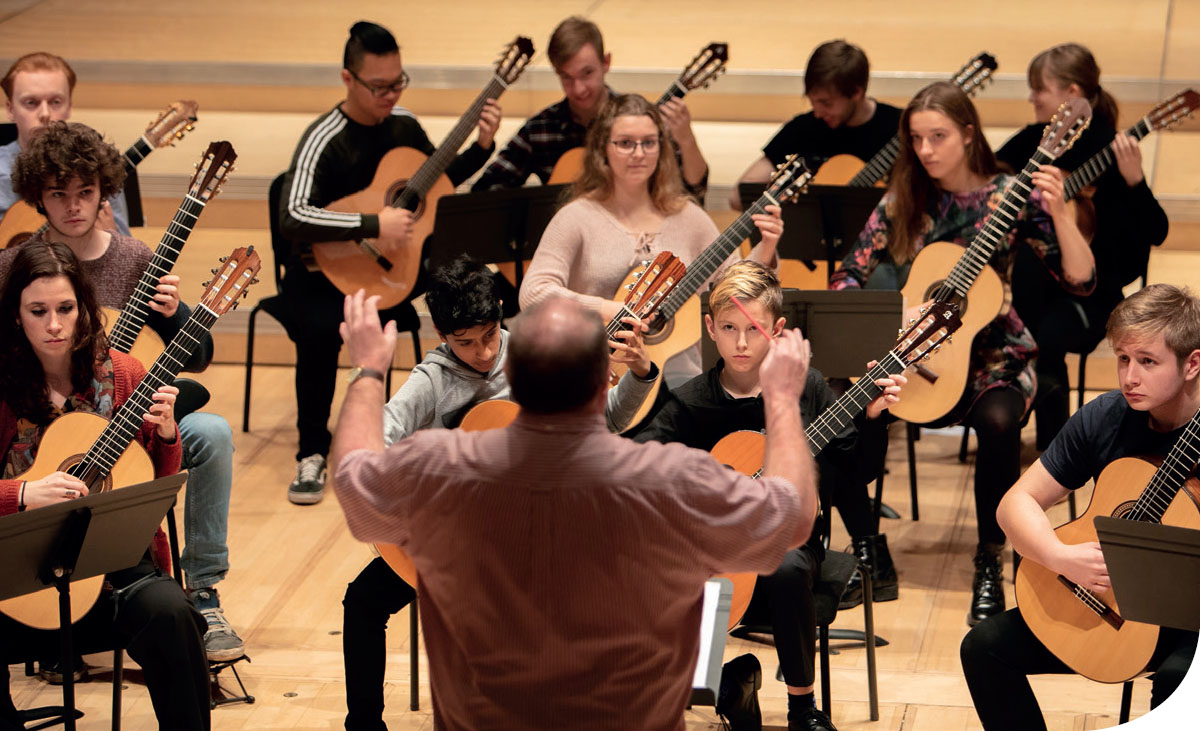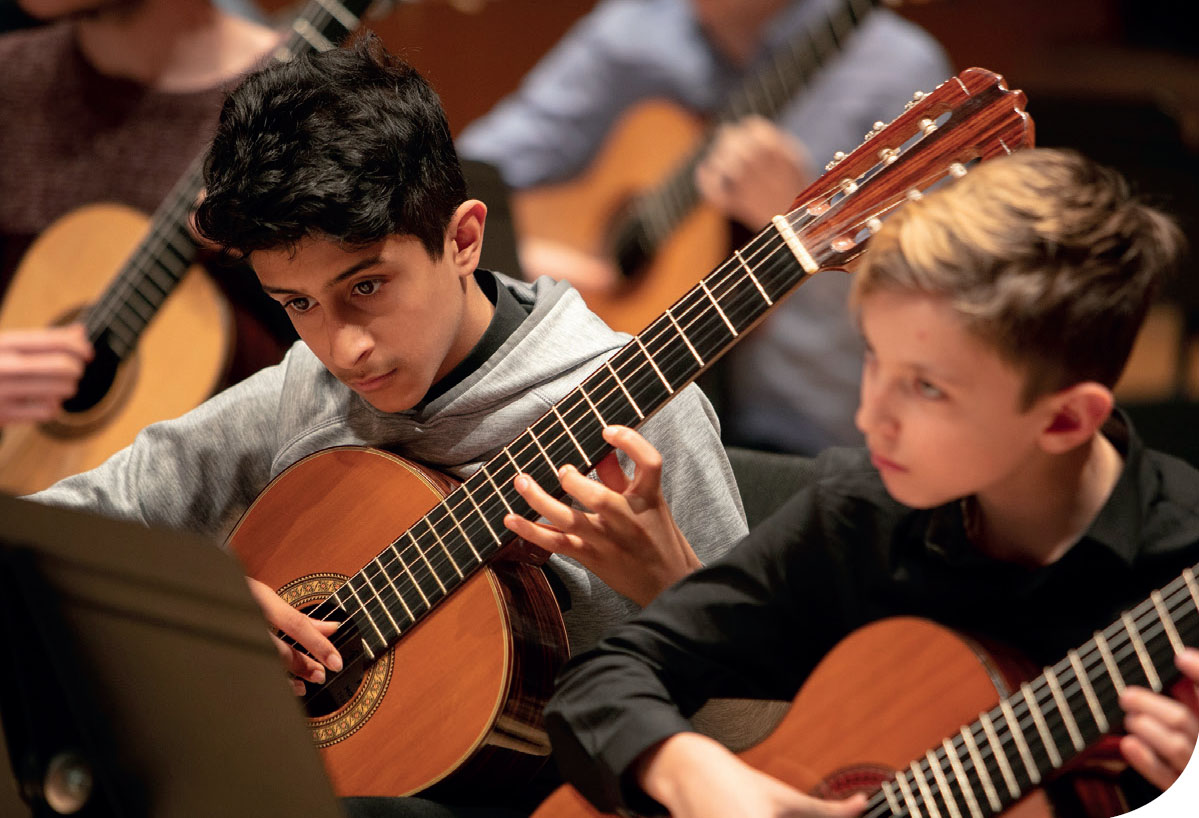
How did you get started in music?
I'm originally from Dundee, in east Scotland. My mum was a piano teacher at a school in the city, so it was sort of compulsory in my home to play the piano! I did also play cello for a while and took singing lessons, the sorts of things you do in school. I then began playing guitar and discovered I really wanted to do that.
Why guitar and not piano or cello?
Once I started to play classical guitar, piano became a bit difficult. If you play guitar in the classical style then you have to grow your nails long on one hand and cut them short on the other. It was always frustrating to not really be able to play piano properly as you just heard the click of my nails as my fingers travelled across the keys. Then, because of the somewhat solitary nature of piano and guitar, I wanted to play in ensembles, which is why I took up the cello. I particularly liked cello as you could basically sit at the back and read the newspaper without anyone seeing, and I enjoyed going to camps and playing music like Walton's ‘Crown Imperial’, Beethoven, and Berlioz – that sort of repertoire just doesn't really exist for classical guitarists so it was nice to play and feel like part of something much bigger.
At some point, I caught [Andrés] Segovia on the radio, playing his solo guitar music, and taught myself what I heard on the radio by taping things. Every Friday, the BBC used to broadcast a guitar concert from Wigmore Hall so I would sit and tape it before trying to copy it. I failed miserably, I have to say, but I kept at it and I thoroughly enjoyed giving it a go. There was also a chap who was my first big influence as a teacher. He was a Canadian jazz musician who used to come to my house – my elder brother played jazz and I played classical. There was one time he played us a 12 bar blues and then a Fernando Sor piece and asked which one I preferred – I went for the Sor and decided that was the route for me. His response was that I liked ‘the good stuff’! At 14 I played my first recital, which was a seminal moment – just me in front of a small audience in a tiny church but still memorable. I did the whole local festival scene, the competitive ones and won all of them! So I thought that I must be quite good and the instrument has basically never left my hands from then on.
If you ask a member of the public about guitar, they'll probably think in terms of pop or rock music – what drew you to classical guitar?
It was the sound. It was the intricacy of the classical repertoire that I found fascinating in those initial stages. I'm a slightly obsessive person – it runs in the family in different ways. For my brother, it's chess and for me it was sitting quite happily in my room for hours on end playing guitar.
That said, I did play electric guitar as a kid and was in a rock band with some mates at school. In its way, that was a sort of primordial chamber music – we'd thrash our way through Black Sabbath, Led Zeppelin, Deep Purple, and the like in a friend's garage.
What were you doing before your current role?
I was travelling a lot, playing chamber music with other musicians. I particularly like that style as I enjoy the social aspect of making music with other people. Initially, when you set out with guitar, there's a lot of solo repertoire and limited dynamics for you to play. It's a more intimate way of making music as you're not often in big spaces.
When I left college, I initially started in contemporary music and joined various contemporary ensembles, which I really enjoyed at the time both musically and intellectually. I played with the Psappha Ensemble in Manchester, which was literally moment-by-moment, second by second, trying to piece it, all together – so complicated.
Guitar and harp is an interesting combination for a department. How did this come about and what are its advantages?
It happened naturally as the plucked strings section of the department grew into its own thing – it made sense to have them together and keep the string department for bowed instruments. But actually, it's worked really well. As I sit here, there's someone next door playing Debussy on the harp and it's lovely to hear.
The harp side is more about the orchestral activities, but the body of students get on well and I think it's educational for both sets to learn from each other's repertoire. There has been some collaboration – about a year ago there were some duos. I was initially dubious but some of the compositions and the performed pieces were really beautiful. Generally, in the wider sense of Celtic music, there is a lot more guitar repertoire and the harp is already a part of that tradition.
What else does your department offer students?
On the guitar side of things we offer quite a wide experience in the sense that, on an average week, a guitar student will have a lesson in their first study, with the option for second study – something like lute, mandolin, banjo, bass guitar, baroque guitar. The idea is to try out things which give them a broader view. There's a technical class every week that all attend, as well as a performance and repertoire class that happens about once a month. An expert in a particular period of music comes in and speaks to the students and they get a chance to play some of that material, such as renaissance or baroque. They also have regular concert opportunities.
It's about providing more than just a lesson. I'm sat here today sorting out who's going to play in The Threepenny Opera, who's going to do the Handel opera, who's coming with us on a trip to play with visiting chamber musicians from London. Some students choose to work in the musical theatre department playing in shows here. On the whole, I think we collaborate a bit more here than in other conservatoires as we've got a lot of the creative arts here as well, like filmmakers – it's not uncommon for students in our department to be writing theme tunes for films that their colleagues are making. It's not a pressure cooker but it's now sort of like a kitchen where we're putting different things together and seeing what comes out – some of the work they are producing is amazing.

© Robert McFadzean
Performers at Big Guitar Weekend
I was a student here a million years ago and never the twain would meet, it was like the Sharks and the Jets with the music and drama schools – that said, I used to give Robert Carlyle guitar lessons in a locker room!
What's it like being on the other side of the lessons?
It felt quite natural in a way. I finished my studies abroad at the Royal Northern College of Music and I always had a hankering to come back to Scotland. Our department has grown, it's much more international now. When I was here, there was one student from England and about eight guitarists who grew up no further than 40 miles from the centre of Glasgow. Now there are students from all over the world, bringing with them their own culture and repertoire, which provides a richer experience.

© Robert McFadzean
Delegates rehearsing at Big Guitar Weekend
To find out more about the courses available at the Royal Conservatoire of Scotland, visit: rcs.ac.uk








